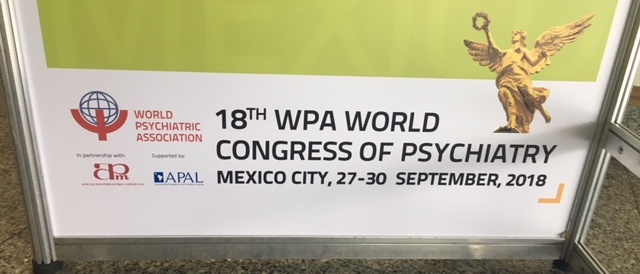
Choose a channel
Check out the different Progress in Mind content channels.

Progress in Mind

Psychiatric disorders comprise a global public health priority as standalone conditions and are often comorbid with some chronic, physical diseases. Despite this reality, only 3% of the time students spend gaining an undergraduate medical education is devoted to psychiatry, according to a WPA survey. Respondents considered that 10% would be a fair allocation. A greater focus on psychiatry in formal training can be complemented by encouraging understanding of their own mental well-being among medical students.
Given the burden of mental illness itself -- and its contribution to physical disease – two months in six years’ of medical education does not justice to psychiatry. Three percent of students’ time massively under-represents the extent of mental health problems encountered in all branches of medicine.
Three percent of students’ time massively under-represents the extent of mental health problems encountered in all branches of medicine
The median 3% figure for the amount of time spent on psychiatry during medical education comes from a WPA e-mail survey in 2017 in which the presidents of member societies or their nominees were asked to provide information on medical education in their respective parts of the world. Data were obtained for 47 countries. The under-representation of psychiatry in the curriculum did not seem to reflect resources since students in high income countries spent little more time on psychiatry than their counterparts in low and middle income countries (4% vs 2.4%).
Presenting these data, Roger Ng, WPA Secretary for Education and an Honorary Professor at the Chinese University of Hong Kong, emphasized the WPA’s support for more time to be allocated for psychiatry and for better integrating the study of mental and physical health.
Mind the gap: 10% is the target time for undergraduates to spend on psychiatry, but the current reality is 3%
Overall, 3.3% of medical graduates went on to specialize in psychiatry. The likelihood they would do this correlated with the amount of time they spent on the discipline as undergraduates.
Three years ago, the Faculty of Medicine at the Chinese University of Hong Kong set up a Wellness Team of clinical professors, student counsellors and alumni to foster mental resilience in medical students and promote a culture of self-care and peer-support through outreach programs, education, identification of at-risk groups and individual coaching.
Winnie Chan (Student Counsellor) and Maxine Cheung (Resident in Psychiatry) described how evidence that levels of psychological distress among medical students are generally higher than in the general population,1 coupled with survey data from their own students showing high levels of depression and burn-out, led them to conclude that medical education should train students to take care of their own well-being as well as that of others.
Their approach to encouraging good mental health is a “pyramid of provision”, with provision of education, knowledge and skills at the lowest level, followed by the engagement of individual understanding, and then making facilities available for counseling and crisis intervention.
The Hong Kong medical school program has already recruited and trained more than a hundred mental health “first aiders” from among the student population.
Student first-aiders in mental health provide initial support and can refer people to specialized services
The Japanese experience of undergraduate education in psychiatry was described by Professor Tsuyoshi Akiyama, University of Tokyo. In 2001, psychiatry was selected as one of the five core clinical training disciplines – along with internal medicine, surgery, obstetrics and gynecology, and pediatrics.
Since then, the number of hours devoted to the teaching of psychiatry and course content have generally improved. The focus is not just on knowledge but on clinical problem solving, taught through workshops, tutorials and role-play. There is objective and nationally-organized testing of knowledge and skills, and students must pass to proceed to clinical clerkship.
Beyond this stage, supervised practice with patients is limited in terms of its ability to develop sufficient clinical competence. And Professor Akiyama looks forward to a time when those training in psychiatry will be taught the skills needed to lead multidisciplinary mental health teams and provide liaison psychiatry support to colleagues in other branches of medicine.
Mariana Pinto da Costa, Queen Mary University of London, UK, and University of Porto, Portugal, and Katerina Dima, Liaison Officer for Medical Education Issues with the million-strong International Federation of Medical Students’ Associations, presented data from a 2018 survey conducted jointly with the WPA into how psychiatry is being taught around the world.
Of the 83 countries providing data, psychiatry was a mandatory part of the course in 81 – the exceptions being Nigeria and Ethiopia, where psychiatry can be studied as an elective.
The shortest durations of training were reported from Asia-Pacific countries, and the longest from the American region. Overall, the emphasis is on theory rather than practice – with theory classes lasting more than 30 days in 37 countries, but practical classes between 1 and 15 days in 29 countries. Early exposure to clinical psychiatry improves students’ awareness and understanding, and should therefore be encouraged.2
Early exposure to clinical psychiatry improves students’ awareness and understanding, and should therefore be encouraged
In most countries, examination was by multiple choice questions, followed by written and oral exams; and many countries used a combination of assessment techniques. But relatively few assessed performance using real or simulated patients.
Given that comorbidity between mental health and other medical conditions is the rule rather than the exception,3 much more training is required for medical students in order to properly address the burden of psychiatric health globally.